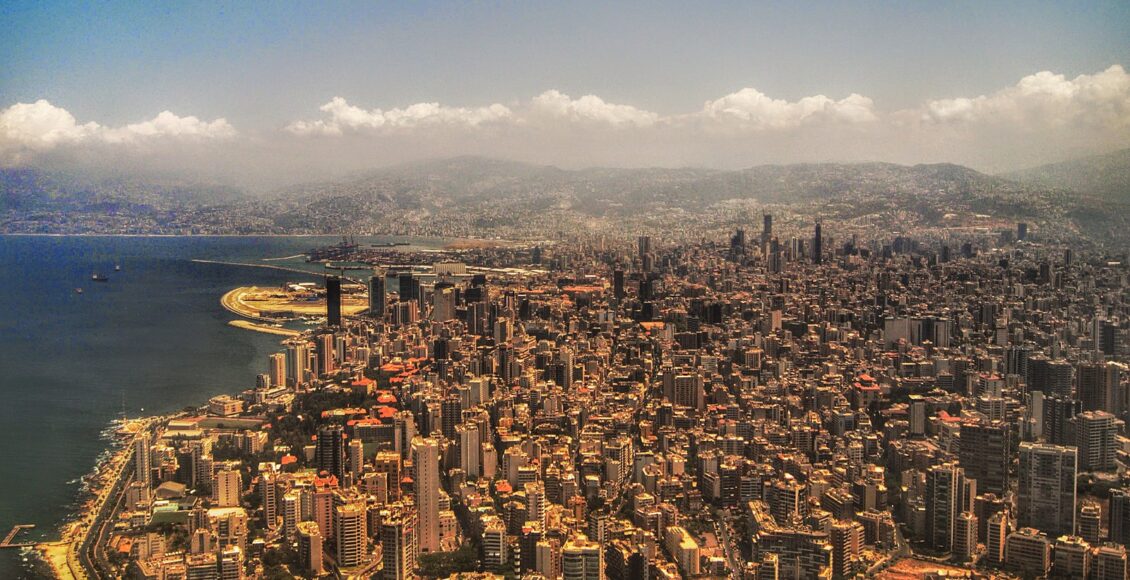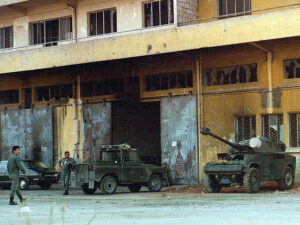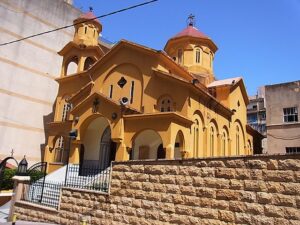Divided by the Politics of Religion, Unified by Humanity: The Story of a Lebanese Student in Montreal

In a far back corner, away from the bustle of Leaves House — a popular student café in Montreal — Rayan, a Lebanese student, sat across from me, fingers interlaced on the table in front of him.
With conflict devastating the Middle East, and Lebanon facing both internal and external turmoil, I asked if Rayan could share a heartwarming story of connection between people of opposing religions — something that would offer hope and show that, on an individual level, peace and understanding are possible. He frowned, as if bemused, and responded that he didn’t have a story because these interactions are ordinary and frequent. His face was earnest, his voice steady.
However, throughout our two-hour conversation, it became clear to me that there remained a lingering sense of separation, both physical and emotional, between the Muslim and Christian communities of Beirut.
Rayan was born in Beirut to an upper-class Maronite Christian family and was raised in the mountains. Every day, he would drive 20 minutes west into the city to attend a French private school. Reminiscing about his childhood, Rayan fondly recalled trips to the beach, family hikes, and music festivals with his friends. Music and singing consumed Rayan’s life; his calm, soothing voice even earned him a spot on The Voice Middle East, a popular singing reality show. Now 21-years old, Rayan has spent the past three years in Montreal, currently undertaking a Political Science undergraduate degree at McGill University.
Rayan holds his faith close to his heart — quite literally, as a small silver cross hung from the chain around his neck. Beyond that, Rayan celebrated Christian holidays with family; Sundays were reserved for Church. That being said, when speaking with non-family members, he explained that religion rarely comes to the forefront of conversation. Shrugging, he told me that he had only recently found out that one of his lifelong classmates was Muslim.
Growing up in affluence, Rayan’s world was somewhat insulated — a circumstance he knows does not represent the typical Lebanese experience. But, in a sense, Rayan believes that this separateness mirrors Lebanon’s larger religious divide, which dates back decades. In addition to the unabating corruption in government, religious tensions between Maronite Christians and Muslims escalated upon the arrival of the Palestinian Liberation Organization (PLO) fighters in Lebanon in 1970. Clashes between Christians — who opposed the PLO and wanted to preserve the status quo — and Muslims and leftists — who supported the PLO cause and desired more political power — culminated in the Lebanese Civil War (1975-1990). During the war, Beirut was divided between East (Christian) and West (Muslim). Although no official demarcation line remains, these religious communities are still largely segregated.

When I asked if Rayan would befriend a Muslim person, he looked amused, as if the answer was obvious. “Of course,” he was quick to respond. It is estimated that 70 percent of Lebanon’s population is Muslim, but when I asked if he currently has any Muslims friends, he hesitated before admitting, “No.” I then asked if he’d ever had a Muslim friend, and his answer remained the same. It became clear throughout our conversation that Rayan doesn’t actively avoid these connections. Instead, he finds it challenging to form them due to the fact that he lives in a Christian community segregated from Beirut’s Muslim neighbourhoods.
Rayan rarely visits the Muslim side of Beirut. He and his friends will occasionally go to the ABC Mall in the Muslim neighbourhood of Verdun. This new mall, Rayan explained, has specific stores that he cannot find in his area. Unlike in his own neighbourhood, Rayan feels lost in the Muslim neighbourhoods, almost as if he’s in a different city. It’s not only the unfamiliar streets, but also the different attire, with people wearing hijabs and other traditional clothing, that contribute to a lingering schism between these two communities.
Last summer, despite ongoing clashes between Hezbollah (the Shia militia backed by Iran) and Israel, Rayan’s voice never wavered. Even amid convulsions emanating from sonic booms, Rayan explained matter-of-factly that his summer was spent like any other. He went to the beach during the day and the club at night.
However, since returning to Montreal in September to complete his final year at McGill, the war in Lebanon has intensified, and so have Rayan’s feelings. In recent months, Israel’s missile attacks and ground invasion in areas in southern Lebanon have displaced around a million Lebanese civilians, primarily Shia Muslims, pushing them northward. Some of these refugees have sought shelter in Christian neighbourhoods, including Rayan’s.
At this point in our conversation, Rayan’s posture shifted slightly. He unlaced his hands and began to twiddle his fingers, hesitating as he looked everywhere but at me: “it’s difficult. I am concerned,” he finally admitted, referring to the influx of Muslims into his community. His words reveal a sort of double segregation between these religious communities — both a physical separation and an internal divide. Rayan was conflicted over his feelings toward this intermixing.
On an individual level, Rayan is empathetic. The morning of our conversation, he spoke with his mother on the phone, who informed him that her Sunni employee’s house had been destroyed by an Israeli missile, leaving him with no home. The employee has since fled deeper into Beirut. Reflecting on this all-too-familiar story, Rayan’s previously equanimous expression turned despondent: “when your city is being destroyed step-by-step, religion doesn’t matter. If you’re human, you don’t think it’s normal.”
Nevertheless, on a societal level, Rayan has struggled to accept the demographic shift in Beirut. Christian neighbourhoods in the city are generally wealthier. After the Ottoman Empire’s collapse, French colonial powers established a constitution that favoured Maronite Christians, granting them the presidency and creating a government quota system that represented the religious demographic at the time. Christians are now the minority, yet they still benefit from that system. As a result, Rayan’s neighbourhood is wealthy, educated, and well-maintained. This reflects a stark contrast, he explained, to the conditions of refugees, who often come from impoverished areas, bereft of basic necessities.
Rayan worries that mutual resentment will build, reigniting enmities from the Civil War. Already frustrated by Lebanon’s economic hardships, Rayan believes that “they’re [refugees] coming into our space, and we can’t afford this many people in our communities…it’s a recipe for disaster.” He believes that the lack of infrastructure and resources, exacerbated by the 2019 economic crisis in Lebanon, will heighten tensions, preventing dialogue between religious communities.

Rayan spoke as though he saw this as an issue of class and education. Although these factors undeniably play a role, religion does as well. When asked if he would feel differently if the refugees were lower-class Christians rather than Muslims, he found it difficult to admit — to both himself and to me — that he’d be more inclined to help them, implying that when it comes down to large groups of people rather than individuals, he has a natural inclination to care more for people of his own faith.
Although Rayan believes that this favouritism somewhat connects to his sense of community, he suggested that these religious divides stem from the politicisation of religion and will not disintegrate until the government system changes. In his opinion, the government’s incorporation of religion — although intended to bring people together — fuels divisions, leaving religious groups physically and emotionally isolated from one another. Not only is the government founded on a quota system that no longer reflects Lebanon’s religious demographics, but since 2022, the country has been governed by a weak caretaker administration with little power. Hezbollah has essentially stepped in as a parallel government, supporting and prioritising the Shia population, and simultaneously reinforcing religious tensions.
The current domestic and regional turmoil in Lebanon has elicited the highest church turnout Rayan has seen in his neighbourhood, with people waiting in lines to enter. Lots of people in Beirut, Christian and Muslim, are praying right now, but in separate institutions on opposite sides of the city. Rayan believes they are all praying for the same thing and wishes they would come together to pray as one. Rayan’s hope is for the constitution to be rebuilt on secular, as opposed to sectarian, values that would allow Lebanese people to unite around shared ideals rather than religious identity.
As our conversation came to a close, Rayan’s composure shifted. “If I can go back, I would be the first to go back, but the country is not letting me right now,” he said, his voice still level but laced with longing. Sadly, Rayan was unable to return to visit his family over McGill’s October reading break, and remains uncertain on whether he will be able to visit during Winter break. Regardless, he continues to attend classes, sing for fun, and call his family members back home.
Rayan’s ability to press forward exhibits the strength of the Lebanese people. Although the politicisation of religion has perpetuated ongoing divides in Lebanon, Rayan made it clear that there is one thing that unites all Lebanese people: resilience.
Edited by Grace Hodges
Featured image: An aerial view of Beirut, Lebanon. “Beirut close to plane descent” by marviikad is licensed under CC BY-SA 2.0.
